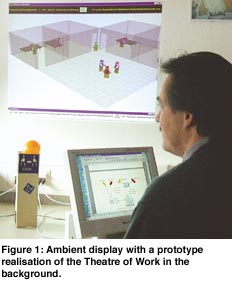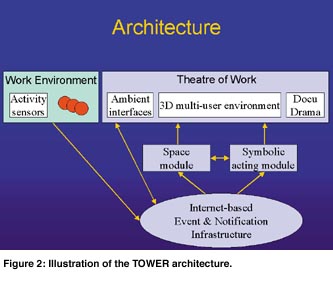


by Wolfgang Prinz and Uta Pankoke-Babatz
The TOWER project aims to bring the wealth of clues and information that create awareness and cohesion in collocated teams to the world of virtual teams. TOWER will develop a ‘Theatre of Work’, a 3D-representation of teams and their work, which will enhance distributed teams with group awareness and spontaneous communication capabilities. Thus TOWER will facilitate a new way of working across time and distance.
In a collocated team, members typically learn from a wide range of cues about the activities of the other members, about the progress in the common task and about subtle changes in group structures and the organisation of the shared task environment. Most of the group awareness is achieved without specific effort. Work is a theatre of communication and activity, a balance of ‘players’, roles, artefacts, space, time, logic, physics, geography, power, social behaviour, trust, self interest, and group interest. The characteristic of communication in such a place is its richness and fluidity, woven into an intricate web.
With TOWER we will create a Theatre of Work for electronic co-operation that echoes the characteristics of the powerful fluidity found in face-to-face interaction. TOWER will support group awareness and chance encounters through a 3D environment which is the heart of the Theatre of Work. Users and their current actions on shared objects while suing a groupware application are represented by avatars and their symbolic actions. An avatar acts out the symbolic meaning of the users everyday actions on their behalf in the space of the Theatre of Work. Avatars of users who work in a similar context appear spatially close in the 3D environment. Movements of an avatar are driven by its user’s action in his work environment. Thus a user must not perform any extra navigation in the 3D world, instead, the TOWER system does the walking – and the acting according to the users actions.
This idea will be extended into asynchronous communication showing a symbolic representation of an asynchronous communication occurring over time. Past events may be recorded and compiled to tell the stories or narratives of past actions. These stories will help users to catch up to the current work situation after temporal absences and in asynchronous work settings.


TOWER will develop a co-operation support infrastructure which consists of the following components (see Figure 1):
These mechanisms will provide new innovative ways of integrating real and virtual workplaces. The real workplace will be extended into the virtual or electronic workplace, and the virtual workplace will be extended into the real one. This will lead to new ways to integrate social and task oriented awareness information.
TOWER will be developed as a construction set which may be used to augment existing groupware systems with awareness information. With this approach, users may benefit from the awareness information provided in the Theatre of Work, without extra effort, in particular they may continue working with the tools and systems they are familiar with. A major objective of TOWER is to find the right balance between the needs to disclose individual activities and the protection of privacy.
The evaluation of TOWER in real work settings and the improvements based on practical experiences are essential to the project. The TOWER project conceives, implements, evaluates, and evolves the infrastructure in three consecutive cycles. Evaluation of the prototypes of the systems will be based on trials in different application areas such as research project work and support of distributed teams at an oil company. Feedback yielded from this use will constantly inform and progress the design of subsequent system versions.
The TOWER project has started in January 2000 and will run until in summer 2002. This activity is funded in part though the IST-program (IST-10846). The partners of the project are: blaxxun international AG, British Telecommunications plc, GMD institute FIT, The Bartlett School of Architecture at UCL, and Statoil’s Research Centre.
Links:
http://orgwis.gmd.de/projects/tower/
Please contact:
Wolfgang Prinz - GMD
Tel: +49 2241 14 2730
E-mail: wolfgang.prinz@gmd.de